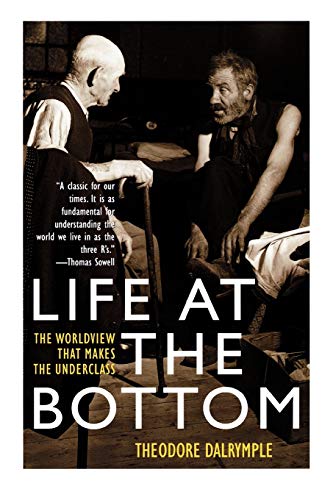Life at the Bottom
The Worldview That Makes the Underclass
Theodore Dalrymple
BOOK REVIEW

The gripping narrative of Life at the Bottom: The Worldview That Makes the Underclass by Theodore Dalrymple plunges readers into a murky abyss of societal malaise, an unsettling realm where apathy intertwines with despair, and hope flickers like a dying candle. This book is not just a collection of essays; it's a raw, unfiltered lens peering into the lives of the underprivileged, revealing a landscape shaped by cultural decay, moral disintegration, and a cycle of victimhood.
Dalrymple, a veteran psychiatrist and writer, draws on his extensive experiences working in one of the toughest neighborhoods in England, where he has seen, firsthand, how choices become prisons for many. His sharp, candid insights provoke a visceral reaction; they shake you awake in an indignant rush and force you to confront uncomfortable truths about societal norms and personal responsibility. The underclass depicted in his work is not merely a statistic. It is a human condition - a collection of stories marked by varied struggles, yet bound by a common narrative of resignation.
It's stunning how Dalrymple examines the very essence of what has led to the creation of this underclass. Through compelling anecdotes, he exposes the pervasive sense of entitlement that cripples ambition and discourages effort - a phenomenon that many readers may find both alarming and alarmingly relatable. The portrayal is unapologetic, crafted with precision, holding a mirror to the society that often turns a blind eye to the stark realities these individuals face.
One reader succinctly encapsulated the essence of Dalrymple's critique: "He exposes the ugly truth behind the gloss of societal compassion - that enabling passivity is not kindness." Indeed, this book ignites a fiery debate about the nature of welfare, responsibility, and the morality of societal interventions. Is our compassion breeding a culture of dependency? Are we nurturing generations that equate survival with entitlement rather than hard work? Just as these questions spark outrage, they kindle necessary reflection, drawing readers into an emotional struggle that is hard to dismiss.
However, the reception of Dalrymple's work is not without controversy. Critics have called him a purveyor of elitism, accusing him of lacking empathy for the very people he critiques. They argue that while he paints a vivid picture of despair, he offers little in the way of constructive solutions. This polarizing perspective begs the question: Is it too harsh for a society built on the foundational belief of equal opportunity? Or is it exactly the kick in the pants that some of us need to wake up to our personal agency?
The historical context of Dalrymple's writing-in the early 2000s-adds layers to his analysis. It's a time when welfare as we know it was facing significant scrutiny, and the emerging debates around personal responsibility were bubbling to the surface. Today, as we navigate through a complex web of social policy and class stratification, his insights ring even louder, screaming for our attention. The fabric of his observations is interwoven with threads of history, sociology, and psychology, presenting a tapestry that is both intricate and disconcerting.
Dive deep into the pages, and you're not just reading words; you're embarking on a journey through the underbelly of society, a journey that unearths not just the plight of the less fortunate, but also the complicity of the broader societal structure. This is more than just a book; it's a wake-up call, an invitation to scrutinize the status quo, to engage with the uncomfortable, and to confront the demons we often choose to ignore.
"The very notion of 'help' needs to be questioned," Dalrymple contends, as he deftly navigates the intersection of intention and outcome. His prose does not sugarcoat the truth; it pierces the heart of the matter with relentless fervor. This emotional rollercoaster implores readers not only to reflect on their societal roles but also to challenge their beliefs about compassion and support.
As you close the final pages of Life at the Bottom, an unsettling awareness lingers-a compelling urge to reassess positions we take for granted. The urgency to question the motives behind our societal structures is palpable, perhaps even frightening. And in this revelation lies a profound truth: Ignorance is not bliss-it's complicity in the cycle of despair.
Embrace the chaos of thoughts Dalrymple evokes. Allow his words to rattle you, to challenge your perceptions, and to awaken a sense of social consciousness that we can no longer afford to ignore. In an era where socio-economic divides widen and voices of the marginalized are drowned out in political agendas, this book serves as a clarion call to reality. Don't miss out on this gripping exploration that demands to be read, discussed, and, above all, felt.
📖 Life at the Bottom: The Worldview That Makes the Underclass
✍ by Theodore Dalrymple
🧾 284 pages
2003
#life #bottom #worldview #that #makes #underclass #theodore #dalrymple #TheodoreDalrymple